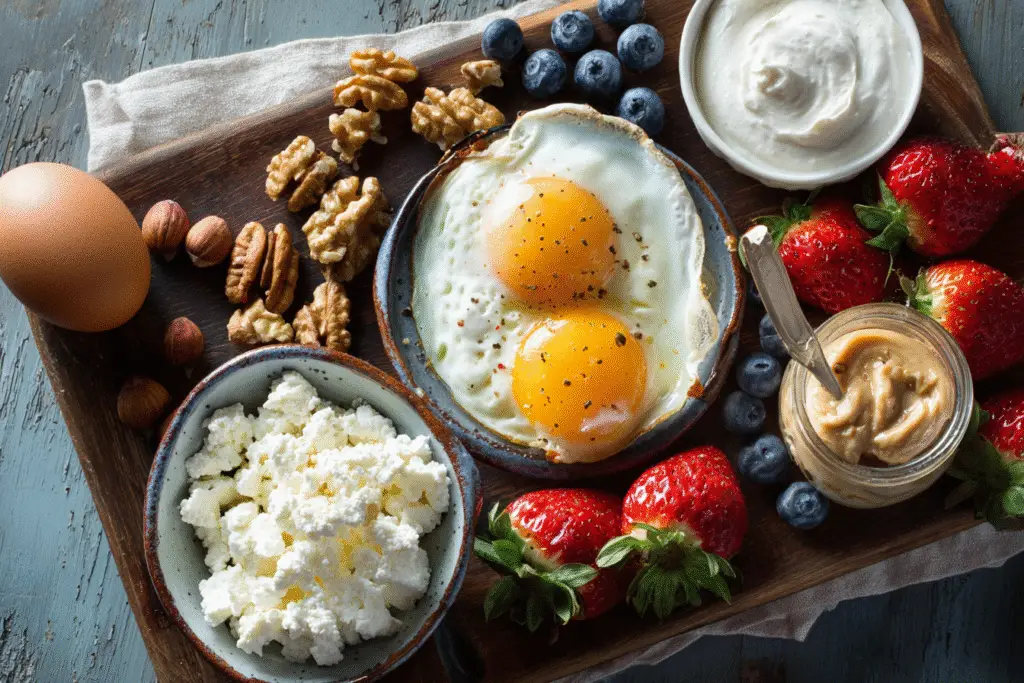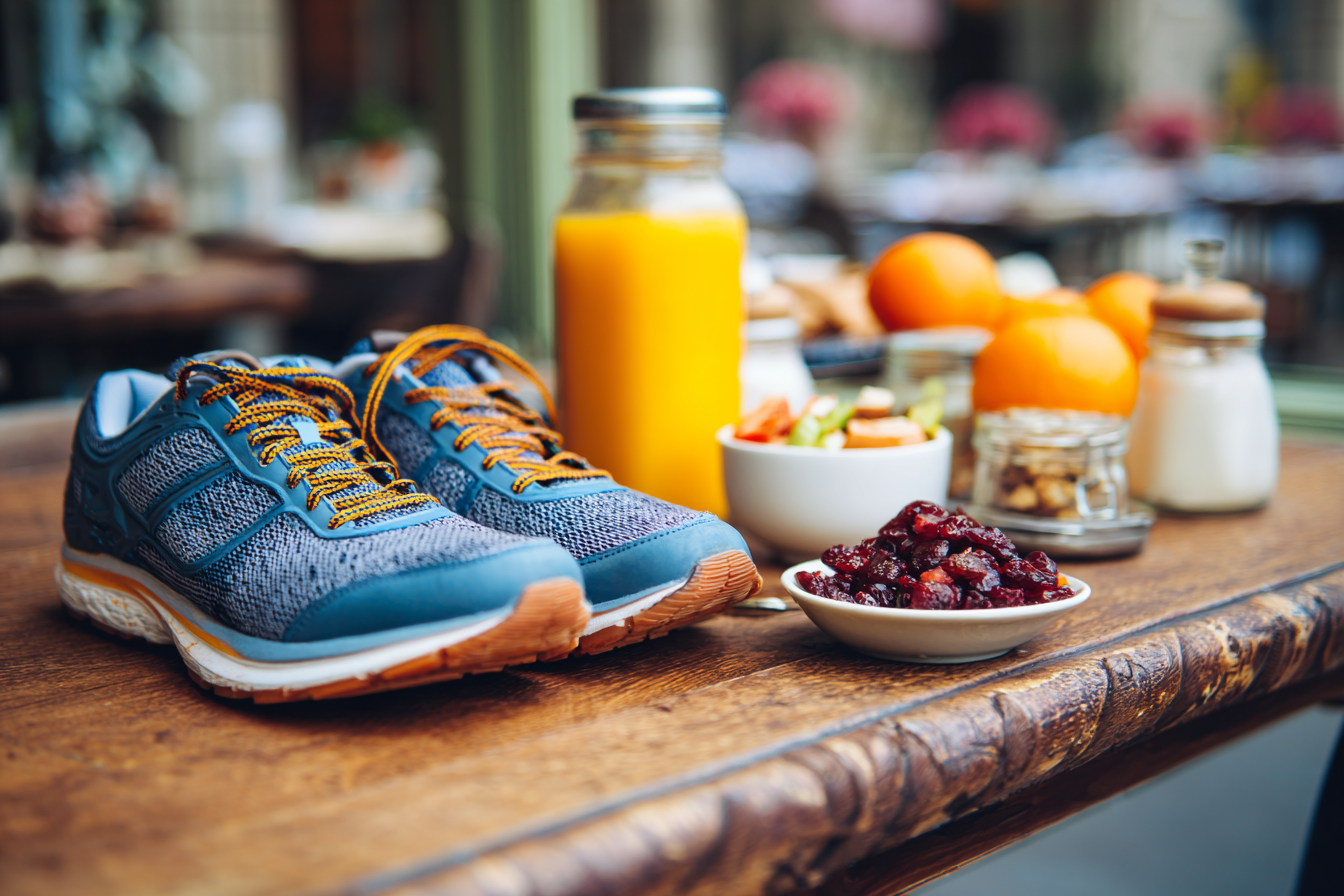Many of us wonder what we should eat before a race to feel our best and perform at our peak. The best breakfast for runners before competition is an easily digestible, high-carbohydrate meal eaten a few hours before the event to top off our muscle and liver glycogen stores. Foods like oatmeal with fruit, toast with honey, or a banana with a bagel are popular choices that can keep us energized without upsetting our stomachs.
Getting breakfast right can make a real difference in our performance. When we prioritize the right balance of carbs and fluids, we’re setting ourselves up for a successful race day, as recommended in recognized nutrition strategies for runners. There’s no one-size-fits-all meal, but with a bit of practice and planning, we can find what works best for each of us.
Why Breakfast Matters for Runners
Breakfast is a cornerstone for runners aiming to maximize endurance and performance. What we eat in the morning helps fuel our bodies, maintain balanced energy, and support physical demands on race day.
Impact on Energy Levels
Eating breakfast can make a noticeable difference in how energized we feel during a run. After an overnight fast, our bodies have used up a significant portion of available energy. When we skip breakfast, we often start training or racing at a disadvantage, leading to early fatigue.
A balanced pre-run breakfast provides easily digestible carbohydrates. These carbs help raise our blood glucose, delivering quick energy to our muscles. Including a small amount of protein can also stabilize our energy throughout the morning.
For runners, options like oatmeal, toast with nut butter, or a banana with yogurt help us avoid sluggishness. Prioritizing our morning meal means we are less likely to feel drained halfway through a race.
Role in Glycogen Stores
Carbohydrates in breakfast help replenish and maximize our glycogen stores, which are the main fuel source during endurance exercise. Glycogen is stored in our muscles and liver. If we start a run with low glycogen, muscles fatigue faster and our performance drops.
Endurance athletes are often encouraged to eat a high-carbohydrate meal several hours before racing. This strategy allows time for digestion and optimizes glycogen loading, making sure our muscles are ready for action. According to research, an easily digestible, high-carbohydrate breakfast can delay fatigue and improve output.
To support high-intensity or long-duration runs, we want to focus on meals such as toast with jam, porridge, or low-fiber cereals that are gentle on the stomach and rich in carbs.
Connection to Athletic Performance
A good breakfast goes beyond simply avoiding hunger pains. Research indicates that runners who eat breakfast report lower perceived exertion and can maintain a stronger pace, especially in endurance settings. Skipping breakfast may lead to flat energy, slower reaction times, and reduced motivation.
Studies conducted on endurance athletes find that having a pre-run meal leads to better performance during long runs, and even short- to mid-distance races benefit from proper fueling. Runners consuming breakfast adapt better to high demands, allowing sustained speed and focus.
Including meals that balance carbohydrates, some protein, and easy-to-digest foods increases our chances of excelling. A well-timed breakfast is a practical edge we can apply to our training and competition routines.
Essential Nutrients in a Pre-Race Breakfast

Building the best pre-race breakfast means paying attention to the nutrients that fuel our muscles, steady our energy, and support digestion. To perform our best, we have to make wise choices about carbohydrates, protein, fats, and fiber.
Complex vs Simple Carbohydrates
Carbohydrates are our main source of energy as endurance athletes. We need to include both complex and simple carbs in our pre-race meal, but in the right balance. Complex carbs such as oats, whole grain bread, and brown rice digest slowly, providing a steady release of glucose. This helps prevent energy crashes during competition.
Simple carbs, like fruit or honey, digest quickly and give us an immediate boost. But relying only on these can lead to spikes and dips in blood sugar. Combining complex carbohydrates with a moderate amount of simple carbs lets us sustain energy through our run. Choosing options like oatmeal with banana slices or whole grain toast with a little jam offers a great mix.
Aiming for a pre-run breakfast that contains mostly complex carbs keeps our performance stable and helps us avoid unwanted fatigue.
Importance of Protein
While carbohydrates take center stage, protein remains important in our pre-race breakfast. Protein helps us preserve muscle mass, supports recovery, and can keep us feeling satisfied.
Intake should be moderate to avoid digestive discomfort. Good sources include eggs, Greek yogurt, nut butters, or a small serving of cottage cheese. Our goal is to include around 10-20 grams of protein, adjusted for our body size and preferences.
Pairing protein with complex carbs slows digestion just enough to reduce hunger but still lets us access energy quickly. For example, a bowl of oatmeal with a side of scrambled eggs or yogurt offers a smart combination that fuels us without feeling too heavy. Including protein can also help repair muscle, especially when training intensively or racing multiple days, as seen in professional endurance events like the Tour de France nutrition plan.
Healthy Fats and Fiber
Although often overlooked, healthy fats and fiber play a key role in a balanced pre-race meal. Fats, especially unsaturated varieties found in nuts, seeds, and avocado, can provide lasting energy for longer events.
Fiber, mainly from whole grains and fruits, helps manage blood sugar and prevents digestive issues. We should include some fiber, but not so much it causes stomach upset before running. Keeping fat and fiber intake moderate is best—too much may slow us down or cause discomfort.
A sample of healthy fats in our breakfast could be a teaspoon of almond butter on whole grain toast or chia seeds stirred into porridge. This mix balances out the meal, keeping our energy steady throughout the race and making sure our digestion stays on track.
Top Breakfast Options for Runners
Before a race, what we choose to eat can influence our energy levels, digestion, and overall performance. It’s important to prioritize familiar, easily digestible foods that give us balanced carbohydrates, a bit of protein, and some healthy fats.
Oatmeal and Porridge
Oatmeal remains a classic pre-run food due to its high carbohydrate content and ability to provide long-lasting energy. We can prepare it with water or milk, and for extra flavor and nutrients, add toppings like bananas, berries, chia seeds, or a drizzle of honey.
Porridge shares many of these benefits, especially when made with rolled oats or muesli. The slow-release carbs help us avoid blood sugar spikes and crashes during competition.
Oatmeal and porridge are gentle on the stomach, making them a dependable breakfast option before a race. When paired with nuts or seeds, we add a bit of protein and healthy fats, supporting muscle function without feeling too full.
Eggs and Toast
Eggs on whole wheat toast form a balanced breakfast, giving us both high-quality protein and steady carbohydrates. We get sustained energy and a feeling of fullness for longer miles. Scrambled eggs, hard-boiled, or even a breakfast burrito can all work well.
Whole wheat toast is higher in fiber and nutrients compared to white bread. Adding avocado or a few slices of tomato boosts nutrients and taste without making our meal too heavy.
When we want to maximize muscle repair and power, eggs with toast help us meet those needs. The combination is easy to digest when we watch our portion size and avoid excess fats or spicy toppings.
Smoothies and Parfaits
A smoothie can be ideal when pre-race nerves make heavier meals seem unappealing. By blending bananas, berries, Greek yogurt, chia seeds, and a splash of milk or juice, we create a light, nutritious drink that delivers carbs and protein.
Greek yogurt parfaits are another option, allowing us to layer granola, fresh fruit, and seeds for a quick but powerful meal. These are especially helpful if we are short on time or want to eat on the go.
Smoothies and parfaits are easily customizable, so we can adjust ingredients to suit dietary needs and preferences. Including a bit of nut butter or flaxseed adds healthy fats, enhancing satiety without weighing us down.
Have a look at our smoothies category for some inspiration!
Bagels, Waffles, and Cereal
Bagels offer a higher density carb choice, making them a staple for many distance runners. Topping a whole grain bagel with a thin layer of peanut butter or low-fat cream cheese gives us extra staying power for long efforts. For those who prefer something sweeter, pancakes or waffles work well when kept simple and light on syrup.
Breakfast cereal with milk is easy to digest, but it’s important to pick options with moderate sugar and added fiber. Some runners opt for muesli or granola with milk or Greek yogurt for a balanced mix of carbs, protein, and crunch.
All these breakfast options are quick to prepare and easy to customize with fruits or seeds. For more options, see this nutrition plan for runners.
Planning Your Race Morning Meal

The right race morning meal can help us start with sustained energy, stable blood sugar, and enough hydration to compete at our best. Taking a practical approach to timing, hydration, convenience, and expert advice gives us the confidence to line up well-prepared.
Timing Your Breakfast
Eating our race day breakfast at the right time is essential to support both digestion and performance. Typically, we aim to eat our main pre-race meal about 2 to 3 hours before start time. This helps us avoid any stomach discomfort and allows our bodies to convert food into accessible fuel.
If a race begins very early, it’s helpful to get up a bit earlier to give ourselves time to eat and digest. For short or early morning events, we might opt for a lighter snack, like an energy bar or a slice of toast with nut butter, 1 hour before.
Key guideline:
- 2–3 hours before for full meal (oats, banana, toast, eggs).
- 1 hour before for light snack (banana, energy gel, simple bar).
If we’re racing later in the day, we should still eat a balanced breakfast at our usual time and add a top-up snack about an hour before the event. Practicing our breakfast routine during training lets us find what works best and reduces race day surprises.
Hydration and Electrolytes
Hydration sets the stage for optimal race performance. We need to be well-hydrated before arriving at the start line. That means sipping water or a sports drink with electrolytes in the hours after waking up.
Electrolytes are especially important if we’re racing in warm weather or expect to sweat a lot. Adding a pinch of salt to our breakfast or drinking an electrolyte-rich beverage can help replace sodium lost through sweat and reduce the risk of cramps.
We should use the bathroom about 30-60 minutes before the race starts and stop drinking heavily at that point to avoid mid-race pit stops. If we prefer, we can carry a small bottle of water or an electrolyte gel to the start.
- Hydrate as soon as we wake up, not just at breakfast.
- Opt for beverages with sodium, potassium, or magnesium if we expect a long or hot effort.
- Avoid overhydrating, which can dilute body salts.
Meal Prep and Convenience
Planning ahead saves us the headache and stress of figuring out what to eat before a race when time is tight. We can prep small containers of overnight oats with fruit, have energy bars ready, or even make a quick sandwich to eat on-the-go.
Packing our breakfast or buying it in advance ensures we avoid surprises if hotel or venue options are limited. Transportable foods like bananas, bagels, and nut butter packets fit easily into race bags. For longer events, including a mix of easy-to-digest carbohydrates and a little protein helps extend energy.
Quick breakfast prep tips:
- Use single-serve oatmeal packets and top with dried fruit.
- Pre-cut fruit or portion out yogurt and granola at home.
- Set out everything we need the night before to save time.
Competitors in ultra races often recommend including a variety of familiar foods for a smoother morning routine and better menu planning.
Expert Tips from Sports Dietitians
Sports dietitians stress the importance of practicing our planned race breakfast during training. By sticking to foods we know agree with us, we reduce our risk of stomach issues on the big day. Professionals also recommend balancing carbohydrates with a small amount of protein and keeping fats and fiber moderate to easy on digestion.
Some expert tips:
- Choose low-fiber, high-carb options like white toast, bagels, or rice for sensitive stomachs.
- Limit high-fat or greasy foods to prevent sluggishness.
- Test any new products, gels, or bars in advance—never on race day.
A variety of ideas for a balanced breakfast that fuels running success are available our guides like Testing our breakfast habits with our normal routine can make all the difference on race day.
Frequently Asked Questions
When it comes to the best breakfast for runners before competition, timing and ingredients make all the difference. A smart pre-race meal can fuel performance and enhance endurance. Let’s dive into some common questions about crafting the perfect energy-boosting breakfast for race day success.
What should runners eat before a race?
A light, carb-rich meal like oatmeal with banana or toast with peanut butter is ideal 2–3 hours before running.
When should I eat breakfast before a race?
Eat your breakfast 2 to 3 hours before race time to allow for digestion and sustained energy.
Are protein shakes good before a run?
Yes, in moderation. A shake with carbs and a bit of protein can be great if you’re short on time before your run.
Should I avoid fats before racing?
Yes. High-fat foods digest slowly and may cause discomfort. Focus on easily digestible carbs instead.
Is coffee okay before a race?
Yes, if your body is used to it. Coffee can enhance focus and performance – but avoid it if it causes jitters or stomach upset.
What’s your go-to breakfast before a big run? Do you have a favorite energy-boosting meal that powers you through race day? Share your thoughts and recipes in the comments!

